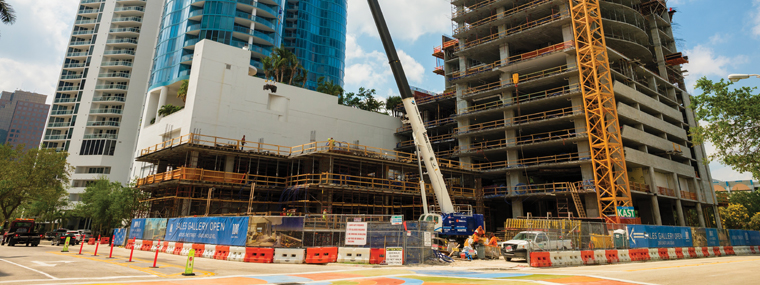
Exterior Maintenance and Renovation
Legal Considerations
By Sanjay Kurian, Esq. / Published February 2020

People come to Florida for its beautiful climate, sun, and sand. The climate is great for tourists, snowbirds, and year-round residents, but the wind, saltwater, and sun can be very rough on buildings. Over the course of time, even the most beautiful buildings will show the effects of age and wear and tear. Renovation, restoration, and preservation of condominium buildings is something that all condominium associations are facing or will eventually face. These projects may be to prolong useful life, beautify, or even enhance functionality. Ultimately every condominium association and its unit owners must deal with maintenance and renovation.
These projects include painting, concrete restoration, roofs, balcony railings, lobbies, clubhouses, parking lots, or any other component needing maintenance. In undertaking these projects, associations have many things to consider, including determining what work should be done, how best to do the work, and, of course, how to pay for it.
Once it is determined that some renovation or maintenance should be performed, an association would be well served in retaining a building consultant with knowledge and expertise in the specific area of work to be done. There are many benefits in working with an independent consultant. The key one is to properly define the scope of work and provide appropriate specifications. Without a proper scope of work, an association may undertake work only to find out that the work performed did not address the actual issue because it was not included in the contract. Having an independent consultant prepare the scope of work will prevent many problems.
Regardless of the type of project, the association will have to hire a contractor. The association should make sure the contractor has appropriate licensure. Many types of contractors are required to have state licensure. These trades include roofing, plumbing, and electrical, among many others. However, painting, stucco, windows, and sliding glass doors do not require a state license but may require local licenses. Ask for proof of all licenses from any contractor being considered. You may also choose to verify state licenses at myfloridalicense.com.
An area where associations try to save money is the contract itself. Many contractors use a short one- or two-page “proposal” to do all the work. Such forms rarely protect the association’s interests. Often associations believe that the “proposal” is not a contract; nothing could be further from the truth. In Florida any written document can bind the parties to its terms even if the document fails to properly protect one of the parties. These contracts may not address needed items for the association to protect itself and were more than likely drawn up by the contractor’s lawyer for protection of the contractor.
In handling contracts, it is important to note that there is no “industry standard” form. Contractors often tell associations not to worry and that the contract is an industry standard form or typical. Every form contract is simply a starting point and subject to changes for particular projects. Every contract for each different type of work has unique concerns and considerations for each association. There are many terms that need to be addressed to protect the association. Contract terms are frequently in the form provided by the contractor but are skewed to the benefit of the contractor, not the association.
Once the contract negotiations begin, there are many areas to address if you are the association. Below is a list of contractual issues that should be addressed:
Start date: This one seems basic enough; when will the work start? There are numerous factors at play, though. Will residents be in the buildings? Do the association governing documents require work to be done only within certain timeframes? Does a master association or town have requirements limiting work timeframes?
Completion date: Will the contractor have a certain number of days or be done by a specific date? How will extra time due to inclement weather be calculated? How will notice be provided?
Dispute resolution: No one wants a dispute when a contract is signed, but such disputes are inevitable on many projects. Will these disputes be arbitrated or litigated? What happens when disputes arise during the project?
Bonding: There are two types of bonding, a payment bond and a performance bond. The payment bond is required to be recorded with the Notice of Commencement and protects the association in case the contractor fails to pay its subcontractors or materials suppliers. A performance bond provides some level of protection should the contractor fail to perform and complete the project.
Insurance requirements: In Florida only workers’ compensation insurance is required for contractors. No general liability or other insurance is required by Florida law. The time to address insurance is before the contract is signed. This discussion will need to loop in the association’s insurance agent to ensure that the amounts are appropriate and the contractual terms are consistent with the association’s policies.
Indemnification: Typically, the contractor agrees to indemnify the association, which means that should the contractor or its subcontractors damage persons or property and claims are made against the association, then the contractor will be responsible to the association. Many times, though, contractors will require the association to indemnify the contractor so care needs to be taken.
Access issues: The particulars of any particular property need to be considered and accounted for in providing access. Can the work be staged from the exterior? Does access within the units need to be provided? Does security need to be provided when the unit owners are absent?
Compliance with Florida’s lien laws: The lien law, referred to as the “mechanic’s lien law” by many northern states, exists to protect the rights of subcontractors and materials suppliers. An association needs to ensure receipt of all proper waivers and releases so as to ensure that it does not pay twice for the same work.
Warranties: What types of warranties are being provided by the contractor? The subcontractors? What about any materials suppliers?
Hurricanes: If the work is taking place during hurricane seasons, how will the costs of any demobilization or hurricane protections be paid? Better to have that agreed upon up front rather than three days before potential landfall of a hurricane.
No matter what your renovation or maintenance project is, there are numerous pitfalls for the unwary. From identifying the problems, contracting to have the work done, and deciding how to pay for the work, the process can be very complex. The time to obtain professional help is before the contract is signed and the work is started.
Sanjay Kurian
Lawyer, Becker
Sanjay Kurian has substantial experience representing community associations, owners, and developers in a variety of construction and insurance issues. He is a member of the firm’s Disaster Recovery team and has handled numerous hurricane claims representing condominium associations against their own insurance carriers. Mr. Kurian is Florida Bar Board Certified in Construction Law and AV Rated Preeminent by Martindale-Hubbell. He is also a Florida Super Lawyer, an honor less than five percent of lawyers statewide are selected to receive each year.
For more information, email skurian@beckerlawyers.com, call (954) 987-7550, or visit beckerlawyers.com.




